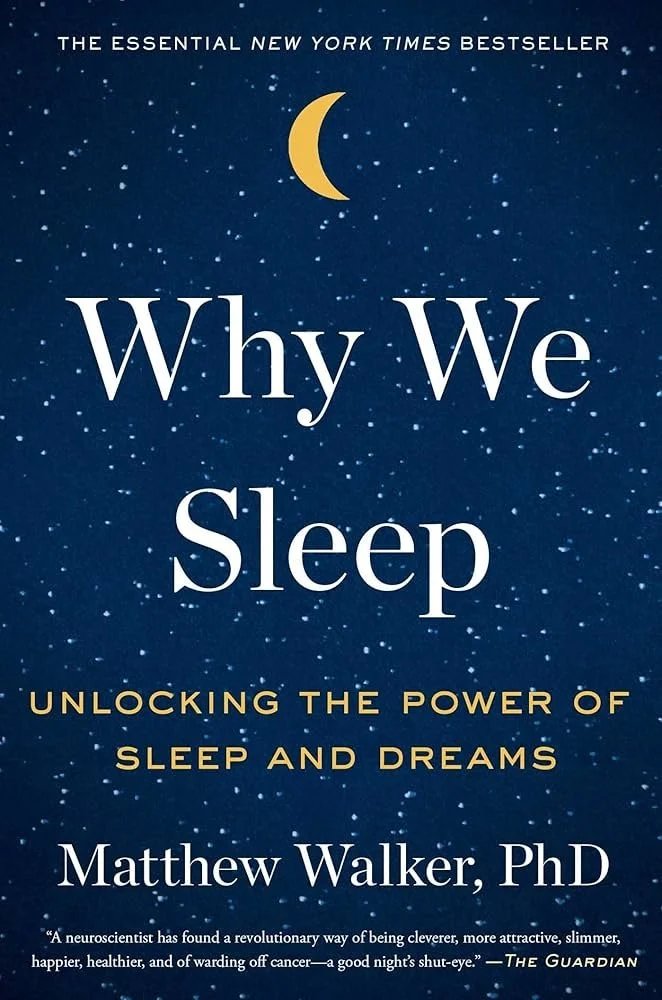Book Review: Why We Sleep By Mathew Walker, PhD
Introduction
This is a book that needed to be written a long time ago. I think inherently moI have listened to Mathew Walker on different podcasts for probably 5+ years, I have known about him since his first Joe Rogan appearance. Matthew Walker, Director of the Center for Human Sleep Science at UC Berkeley, has illuminated the profound effects of sleep on various aspects of health. His book provides a comprehensive look at how sleep influences our well-being. In this review I want to focus on it in relation to nutrition and metabolic health, as opposed to why we have REM sleep or NREM sleep (REM’s main functions are information processing and inspiring creativity/problem solving, NREM’s sleep main function is on memory).
Also, spoiler alert, if you only need 5 hours of sleep you are wrong.
Sleep as a Foundation for Health:
Walker argues that sleep is not merely one of the three pillars of health—alongside exercise and nutrition—but rather the foundation upon which the other two rest. This perspective is crucial for understanding why sleep should be a priority in maintaining overall health. Essentially the more you sleep and the higher the quality of your sleep, everything else in your life will get exponentially easier.
Sleep and Cardiovascular Health:
Sleep deprivation has been shown to significantly impact cardiovascular health. For instance, just one night of reduced sleep—1-2 hours less than usual—can lead to a noticeable increase in systolic blood pressure. Furthermore, lack of sleep impairs the release of growth hormone, which plays a vital role in healing and repairing the endothelium of blood vessels (among other things). This degradation, combined with elevated blood pressure, increases the risk of cardiovascular events. Studies reveal that individuals who sleep only 5-6 hours per night are 200-300% more likely to develop coronary artery calcification over a five-year period compared to those who get 7-8 hours of sleep.
Sleep and Metabolism
One landmark study highlighted by Walker found that restricting sleep to just four hours per night for six nights led healthy participants to develop pre-diabetes. Chronic sleep deprivation is closely linked to insulin resistance, which results in elevated blood glucose levels and a higher risk of diabetes. Not mentioned in the book- I would refer to “Why We Get Sick” by Ben Bickman and “Good Energy” by Casey means- write ups coming soon- but insulin resistance may be the root cause of most chronic health conditions due to its effect on mitochondrial dysfunction.
In terms of hunger and appetite regulation, inadequate sleep affects hormone levels by decreasing leptin (the satiety hormone) and increasing ghrelin (the hunger hormone). Additionally, shorter sleep duration extends the time available for eating, leading to increased caloric intake. Research shows that people who sleep less than 6 hours per night tend to consume an extra 300 calories the following day.
Practical Sleep Tips
To improve sleep quality, Walker’s insights are complemented by practical advice from MedlinePlus:
Maintain a Consistent Sleep Schedule: Go to bed and wake up at the same time every day. **This is probably the most important one on this list**
Limit Caffeine and Nicotine: Avoid these stimulants, especially in the afternoon and evening.
Exercise Regularly: Engage in regular physical activity but avoid exercising too close to bedtime.
Avoid Alcohol: Steer clear of alcoholic drinks before bed. (I would add altogether as even ETOH consumption in the afternoon impairs REM sleep at night).
Manage Meal Timing: Refrain from large meals and beverages late at night. (This is individual but somewhere between 2-4 hours)
Limit Naps: Avoid naps after 3 p.m.
Create a Relaxing Bedtime Routine: Engage in calming activities such as reading or taking a bath.
Optimize Bedroom Environment: Keep the room cool, dark, and quiet; avoid screens before bed.
Get Sunlight Exposure: Ensure you get adequate sunlight during the day.
Address Sleep Issues Promptly: If you can’t sleep after 20 minutes, get up and do something relaxing.
Conclussion:
Walker’s book is a valuable resource for understanding the critical role of sleep in metabolic health and overall well-being. Given that we spend about a third of our lives sleeping, prioritizing sleep can have profound benefits for both physical and mental health. Investing in good sleep habits is a fundamental step toward achieving better health outcomes.

